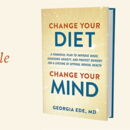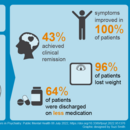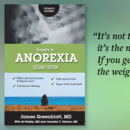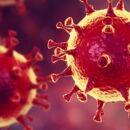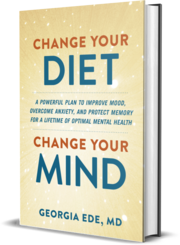Meet Dr. Georgia Ede
I am a Harvard-trained, board-certified psychiatrist specializing in nutritional and metabolic psychiatry. My passion is empowering people with psychiatric conditions to reduce or eliminate the need for medications by changing how they eat. But which changes are worth making, and why? Answering that question is what my work is all about.
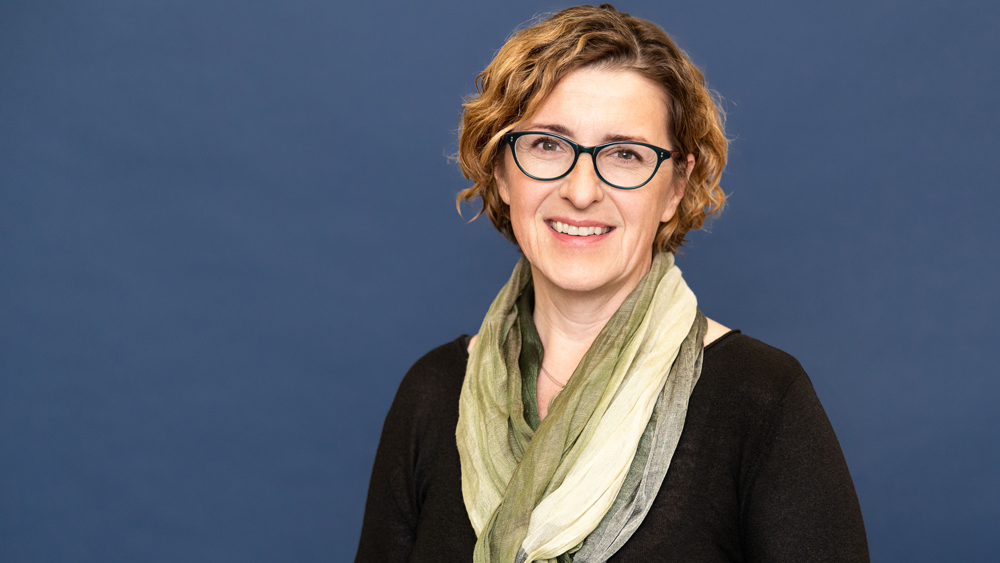
Why Diagnosis:Diet?
Your diagnosis doesn’t have to be your destiny. I created Diagnosis:Diet in 2012 to help you discover the powerful connection between your psychiatric or medical diagnosis and your diet, and to give you the information and inspiration you need to take control of your health. An official diagnosis from a doctor doesn’t usually tell you anything about root causes. Instead of simply accepting your diagnosis, following the medication or surgical treatment plan and living with it for the rest of your life, get curious. WHY is your body malfunctioning? Is there anything you can do beyond medications and operations to help restore it to good health?
If you have a physical or mental health problem, the first place to look is your DIET.
The empowering truth is that the human body is engineered to function beautifully... if fed and cared for properly. The problem is that mainstream nutrition advice is dangerously unscientific. This means that you could be doing a great job following official dietary guidelines and becoming less healthy over time.
As a psychiatrist, I like to ask questions and get to the bottom of things. What I have learned is that nutrition is simple; it is flawed nutrition research methods that twist this simplicity into something hopelessly confusing and complicated. I designed this site to share with you what I discover as I dive deeply into nutrition research in search of clarity and understanding. To question cherished beliefs about food. To satisfy your curiosity about the fascinating ways your favorite foods work in your body. To scrutinize nutrition studies, exposing tragic flaws and groundbreaking insights. To delve into the inner workings of the brain and its metabolism. To explore the healing potential of special diets including low-carbohydrate, ketogenic, elimination, and carnivore diets. To bring you information you can use to improve your mental and physical health. To inspire you to think about food in interesting new ways that could potentially free you from your diagnosis.
About Dr. Ede
I am a Harvard-trained psychiatrist specializing in nutrition science and brain metabolism. My twenty-five years of clinical experience include twelve years as a college psychiatrist and nutrition consultant at Smith College and Harvard University Health Services, where I was the first to offer students nutrition-based approaches as an alternative to psychiatric medications. I speak internationally about dietary approaches to psychiatric disorders. I co-authored the first inpatient study of the ketogenic diet for treatment-resistant mental illnesses, developed the first medically accredited course in ketogenic diets for mental health practitioners, and was honored to be named a recipient of the Baszucki Brain Research Fund’s first annual Metabolic Mind Award. My new book Change Your Diet, Change Your Mind was published in January 2024.
My Story
For decades I followed a low-fat, low-cholesterol, high-fiber, low-calorie diet and exercised regularly. In 2007, as I entered my 40s, I developed a number of perplexing health problems including chronic fatigue syndrome, fibromyalgia, migraines, and IBS. After seeing a variety of Harvard specialists who ordered a host of specialized tests and found nothing wrong, I decided to experiment with my diet. After about six months of trial and error, I was symptom-free.
The unorthodox diet I had stumbled upon was almost the exact opposite of what we are told is healthy for us: a high-fat, high-cholesterol, low-fiber diet consisting primarily of meat, seafood and poultry, with very few plant foods. Not only had this strange way of eating resolved all of my mysterious ailments, it also improved my mood, energy, and concentration. This surprising experience led me on a quest to understand nutrition science (a topic sadly not taught in medical school) and the intersection between diet and mental health (a topic sadly not taught in psychiatry residency training programs). I have now been incorporating nutrition principles into my clinical practice for over a decade.
My Philosophy
I have become convinced that what we eat is by far the single most important factor in our mental and physical health.
This is a conviction initially inspired by my own personal experiences with dietary changes, solidly supported by my deep study of nutrition science over more than a decade, and borne out by the experiences of my patients who have applied nutritional approaches to a wide variety of health conditions, including bipolar disorder, migraine headaches, ADHD, IBS, panic disorder, eating disorders, and many others.
The presentation below summarizes my philosophy about nutrition and mental health, explains the risks of processed foods and plant-based diets, and includes my most important nutrition recommendations for anyone who wants to optimize brain health while reducing or perhaps even eliminating the need for psychiatric medications.
I am one of a growing number of physicians around the world who has come to believe that people who apply the truth about nutrition science to their lives can experience life-changing improvements in their own health and well-being. My nutrition philosophy is grounded in evolutionary science, human metabolism, and food biochemistry.
Unfortunately, even the best of diets cannot cure all diseases. I also believe modern medicines can be important tools for people who are either uninterested in changing their diet or who do not achieve good enough results from dietary changes alone. It may be that many years of following misguided nutrition guidelines and/or exposure to any number of other modern environmental influences does irreparable damage to the chemistry of some individuals, or that some people are born with medical conditions that food cannot heal. However, even in these cases, a proper diet will significantly improve overall health and may reduce the need for medications, perhaps allowing for lower doses or fewer drugs.
We all share the same basic physiology, but there can be important differences between us. While there are some dietary principles that apply to all of us, there are others that can be more flexible. Some people can tolerate dairy, some cannot. Some do beautifully with all kinds of vegetables, while others have to eliminate certain vegetables in order to feel their best. Some can include “safe” or “healthy” carbohydrates in their diet while others must eat a very low carbohydrate diet to be well. My goal is to provide you with the information you need to design the diet that works best for you. I hope you enjoy the journey!
Background and Professional Experience
- B.A. Biology, Carleton College, Northfield, Minnesota
- Research assistant for Carleton College Biochemistry Department, Northfield Minnesota; Joslin Diabetes Center, Boston Massachusetts; Institüt für Diabetesforschung, Munich Germany; and SUNY Stony Brook, Stony Brook New York
- M.D., University of Vermont College of Medicine, Burlington, Vermont
- Psychiatry residency, Harvard University Cambridge Hospital, Cambridge, Massachusetts
- Psychopharmacologist/Psychotherapist/Consult-Liaison Psychiatrist, East Falmouth, Massachusetts
- Psychiatrist and nutrition consultant Harvard University Health Services, Cambridge, Massachusetts
- Psychiatrist and nutrition consultant Hallowell Center, Needham, Massachusetts
- Psychiatrist and nutrition consultant Smith College, Northampton, Massachusetts
Ketogenic Diets for Mental Health
Clinician Training Program
~ 7.0 hours CME
~ live, online, small-group, interactive classes
~ 100+ pages of supplemental materials
Download your free guide to refined carbohydrates and get notified of Dr. Ede's latest posts.
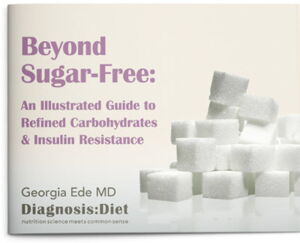
Latest Podcasts
The Dhru Purohit Podcast
Harvard Psychiatrist Explains How to Use a Low Carb Diet to Reverse Brain Fog and Mental Health Disorders
What Your GP Doesn't Tell You with Liz Tucker
Could Changing Your Diet Improve Your Mental Health?
Intelligent Medicine with Dr. Ronald Hoffman
Nutrition-Based Approaches as an Alternative to Psychiatric Medications
Metabolic Mind with Dr. Bret Scher
New Book: Change Your Diet, Change Your Mind by Metabolic Psychiatry Pioneer Dr. Georgia Ede
Maria Emmerich
Can Meat Change Your Moods?
